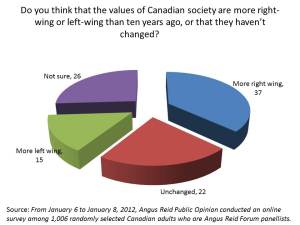With several months of the Conservative majority in place, we can safely identify the direction on issues which clearly touch on Canadian values and culture. Most prominently, is the “law and order” agenda, much of which seems at odds with expert opinions and science. On other issues (foreign policy; pension reform) he has also staked out some unique positions. Is Harper government re-making Canada in his image?
A recent poll question (national online panel) conducted by Angus Reid, that appeared in L’Actualité waded into the issue last week.  On the question, 37% think that the values of Canadian society are more right-wing than ten years ago. Of course, 48% are either unsure (26%) or believe that values are unchanged (22%).
On the question, 37% think that the values of Canadian society are more right-wing than ten years ago. Of course, 48% are either unsure (26%) or believe that values are unchanged (22%).
Not a ringing endorsement of value change but directionally suggests that people lean to the view that we are more right wing. And maybe this rightward tilt is partially driving the success of the Conservatives in moving from opposition to minority to majority in the past federal elections.
Setting aside the veracity of the value movement to the right, the key question is under what conditions do values change. As foundational beliefs we expect values to move slowly and not be subject to shifts within a decade.
What defining events could account for a value shift? Is it a response to the economic troubles of the last few years? A backlash against liberal values? A post-911 consensus? All of these seem hollow. They lack a coalescing force sufficient enough to generate true value change.
But, perhaps it is not value change at all that people are expressing in their answers to the question. Lets posit that there has been no value change. We are not all that different as Canadians now than we were 10 years ago. Which is not to say that the poll is not identifying something of importance.
Public discourse is a key factor that shapes public opinion by providing citizens with “top-of-mind” arguments about an issue and institutionalizing a set of arguments into law may also impact future political discourse.
The fact that 37% believe that we, as a population, are more right wing means that their perception of the status quo has moved. It is this process and the institutionalization of policy change (imagine how hard it will be to recreate the long gun registry) that are most likely to shape the future of Canada.
Question: is there sufficient public desire to challenge government policies so as to undermine the perception that the public is on-side with the government at the level of values?
